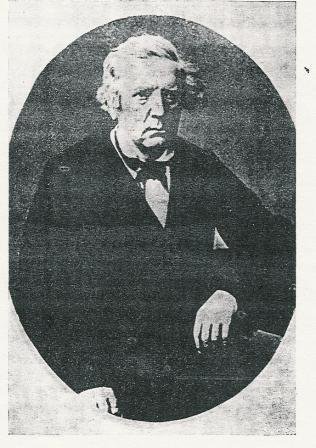Jozef Sklodowski, an eminent educationalist and grandfather of the two-time Polish Nobel Prize winner, died 140 years ago. In the difficult times of the Russian occupation of Poland, he managed to build a modern secondary school in Lublin that educated the founders of Polish Positivism, including the writer Bolesław Prus, the publicist Aleksander Świętochowski, and the inventor and pioneer of psychology Julian Ochorowicz.
In 1829, Skłodowski graduated from the University of Warsaw and began working as a teacher of chemistry, physics and mathematics. Due to his strong character and patriotic outlook, this participant in the November Uprising changed his workplace many times (Biała, Warsaw, Kielce, Warsaw again, Mariampol, Łomża, Łuków and Siedlce). In Lublin, as the headmaster of a grammar school (1851-1862), he left a huge legacy, which was drawn upon by more than just future generations of Lubliners.
Fighting adversity and building a modern school
In Lublin, he found not only huge deficiencies in the equipment of the school premises but also in the teaching staff. He decided to reform the school, showing apparent loyalty to the Russian education authorities, but in reality, he was guided by patriotic motives. In selecting teachers to work at the school, he paid attention to their patriotic attitude, their devotion to youth and their cultivation of Polish traditions. He managed to recruit highly-qualified people for the job, thanks to which the Lublin Gymnasium soon flourished and was able to compete with the corresponding institutions in Warsaw and Kraków.
From the very beginning of his stay in Lublin, Skłodowski strove for the construction of a new school building, as the old post-Jesuit edifice was in danger of collapsing. The director managed to influence the Russian education ministry authorities. Using the argument that a boarding house would be provided at the grammar school, he obtained permission and funds to erect a building that was modern for the time (now 12 Narutowicz Street). After nearly two years of construction, in 1859, the Lublin Gymnasium began work in a building that impressed with its size and became a landmark of the gubernia town. It provided good working conditions, with spacious, high classes and wide corridors. In addition, the attractive building became a venue for public assemblies and meetings of agricultural societies.
Sklodowski’s important achievement as headmaster was the organisation of a modern school library, a natural history museum and chemical and physical science rooms. In a short period of time, he arranged the school archive and library collection, which grew to over 18,000 volumes. He enriched the library with numerous books, periodicals, collections of maps, graphics and prints even from the 16th century. The school became the largest scientific institution in the city and the first public reading room for the citizens of Lublin, achieving a high rank in the whole Kingdom of Poland.
In his work, Skłodowski emphasised the care of his pupils and ensured their proper development. He fought against school absenteeism and the popular phenomenon of youth gambling, introducing custodial punishments, corporal punishment and, as a last resort, even the removal of a pupil from school. Pupils were able to entertain in leisure activities such as walking or swimming in the river and their favourite game of stickball. At school, they were provided with good conditions for games and gymnastic exercises and adequate medical care.
The Polish school under Russian annexation
Despite the onerous regulations imposed on education by the Russian authorities, the headmaster of the Lublin gymnasium tried to circumvent the regulations under various pretexts. As a lover of nature, he organised excursions for pupils in the vicinity of Lublin, during which he let them sing patriotic songs and referred to historical events. The headmaster also defended the pupils in conflicts with teachers who overstepped their authority and sought to Russify the pupils. Throughout the entire period of Skłodowski’s work in Lublin, the gymnasium retained the character of a Polish school. When in 1861 the lands of the Kingdom of Poland were flooded by a wave of anti-Russian patriotic demonstrations, the headmaster indulged the students who participated in them in large numbers, despite pressure from the Russian authorities. As a patriot, he understood and shared the ideals and aspirations of his pupils.
Inspiration for his granddaughter, a Nobel laureate
He eventually paid for his attitude by his dismissal from his post on 1 October 1862. However, he managed to build up a great deal of authority among students and teachers. He created the conditions for the development of a Polish scientific and patriotic elite. This is evidenced by the recollections of the school’s graduates, including Aleksander Głowacki (Bolesław Prus). The Lublin Gymnasium was graduated by some of the leading creators and realisers of the Polish variety of positivism, many well-known national activists, including Jan Ludwik Popławski or Zygmunt Balicki, and prominent scientists.
After his enforced retirement, Skłodowski settled in a manor house in Jawidz in the Lublin region. There, he provided accommodation for the January Uprising insurgents and organised a hospital for the wounded. After the fall of the Uprising, he moved to the municipality of Piekoszów, where he became alderman. After the death of his wife, he left for Zawieprzyce, where he spent the last months of his life. He died on 21 August 1882 and was buried in the family tomb in Kijany.
Maria Skłodowska-Curie, his beloved granddaughter, who inherited her grandfather’s love and talent for the sciences as well as his assiduousness, love of nature and his native country, willingly came on holiday to Zawieprzyce. In Lublin she visited the gymnasium built by her grandfather, where she saw the chemistry and physics laboratories he had set up.





